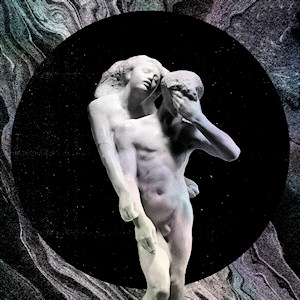
Album Of The Week: Arcade Fire – Reflektor
Arcade Fire’s latest effort isn’t quite the masterpiece the hype would have you believe, but its flashes of pure brilliance save it from disappointment, writes NIALL RUTHERFORD.

As Arcade Fire’s first ever double album, Reflektor carried with it a certain expectation. Countless bands have used double albums to “sprawl” and deliver a messy, occasionally brilliant set of genre exercises and indulgences – Arcade Fire, however, have managed the curious feat of making a double album that manages to sound slightly slim. Reflektor is clearly a double album not for an overflowing bounty of material but because the double album structure allowed them to make an album of two clear halves. Taking even a minute of ambient whirrs off the end of “Supersymmetry” would have allowed it to fit on a single CD, for instance, and a few of its thirteen tracks feel slightly stretched out, like extended versions of non-existent original songs.
Strikingly, the first disc sounds immediately like the first half of a modern classic. Reflektor wisely opens with the lauded title track, and it’s as fitting a first track as ever they’ve made – beautifully noir, cinematic disco, with suitably vogue lyrics on the artifice of the digital age. “Here Comes the Night Time” darts between jubilant, carnival frenzy and a plodding, infectious dub groove. “You Already Know” excuses its inexplicable Jonathan Ross cameo by nearly pulling off a bouncy Smiths impression, and rounding it all off is “Joan of Arc”, a pounding slab of power pop with the catchiest hook in the album. It’s an almost perfect set.
Unfortunately, the second half of the album, with one exception, unravels somewhat – “Here Comes the Night Time II” is a pretty but ultimately flat attempt at setting the scene for the songs to follow. “Awful Sound (Oh Eurydice)”, one half of the album’s mythological centrepiece, is admirable, absurd proof that one cannot simply will a song to anthemhood, and nothing manages to justify or contextualise “Supersymmetry’s” overindulgent denouement.
A bit big-headed, maybe. But we still love them.
By contrast, “It’s Never Over (Oh Orpheus)” is an incandescent triumph. Pulsating bass synths, driving guitar and the tightest beat on the album propel the first two thirds of the track, while the last third slowly melts away to a poetic, ethereal homage to the Orpheus and Eurydice myth, ending on a tragic unresolved note and a pained, shared “oh Orpheus/Eurydice, it’s over too soon” between Butler and Chassagne. It’s no surprise that the album’s best track is the one with James Murphy’s production at its most transparent – in the verses, one hears the ghosts of LCD Soundsystem its galvanic, interlocking layers. Paired with the title track, it’s the glorious realisation of the potential hinted at by The Suburbs’s magnificent “Sprawl II (Mountains Beyond Mountains)”. Naturally, however, it isn’t quite enough to save the second disc from damp squib status with respect to the hype tsunami that the album rode in on.
So why then have they managed to get away with not fully delivering their prophesied Great Fourth Album with Reflektor? Maybe it’s the fact that the band still play and sing with the same desperate intensity that has made their music so influential, exciting and – above all – important. Is it hopelessly naïve of Butler and Chassagne to still tenaciously paint themselves as underdogs four albums in, even if it squarely places them laughably at odds with their self-inflicted “most important band of the last decade” standing and consecutive debuts at the top of the charts? Who cares? Fundamentally, it remains an invigorating experience to hear them – in spite of everything – consistently and earnestly dealing with grand themes in a (mostly) gorgeous, diverse and triumphant musical framework. In short, this is still unquestionably an Arcade Fire album, with the deserved implicit greatness that entails.
